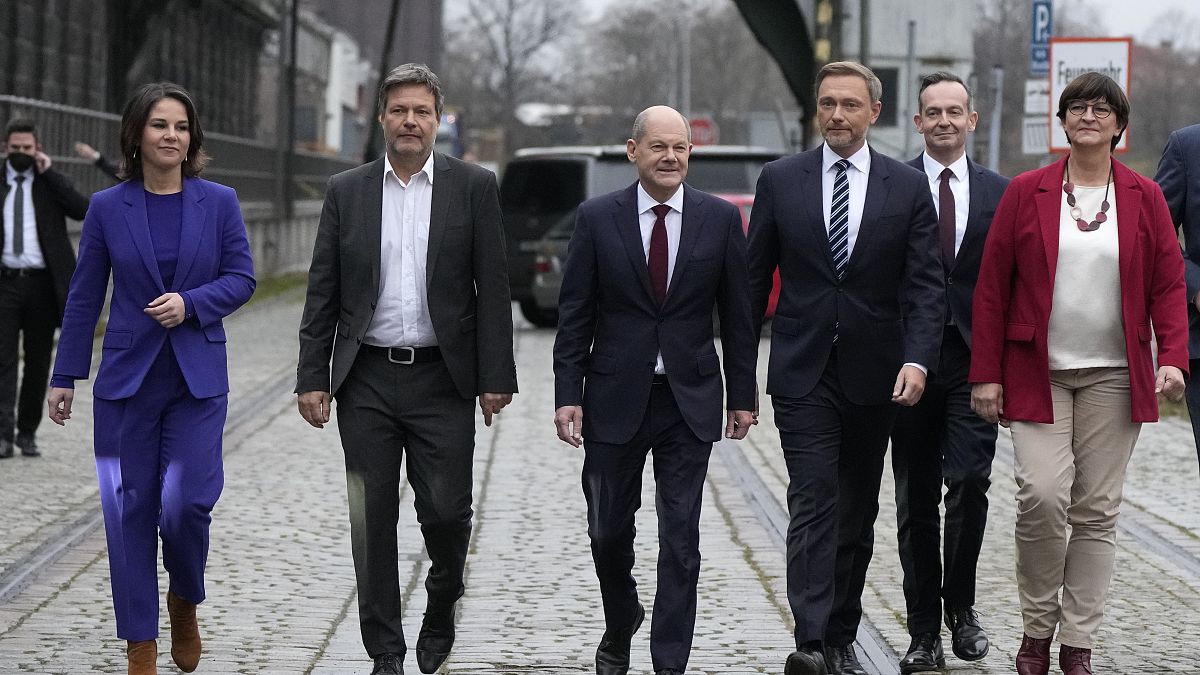Here's how Germany's likely new coalition could change the country.
Germany's prospective new coalition wants to legalise cannabis and phase out coal earlier than planned.
Three parties — the Social Democrats (SPD), the Greens, and the Free Democrats (FDP) — unveiled a coalition deal on Wednesday that should result in the formation of a new government under SPD leader Olaf Scholz.
"We want to trust ourselves and dare to make more progress — in climate protection, in restructuring our industry, in modernising the country, in strengthening social cohesion," Scholz wrote on social media.
He hailed the raising of Germany's minimum wage to €12, an increase in publicly-funded housing, and an expansion of digital infrastructure.
Scholz also pledged to set up a federal-state crisis team and group of experts to brief the government on COVID-19 daily as the country faces a brutal fourth wave of the virus.
"During these days and weeks, we have negotiated closely, intensively and sometimes passionately and, above all, trusting one another."
"I liked that a lot — and strengthened the feeling in me that something has actually grown together as a coalition," he stated.
Green party leaders Annalena Baerbock and Robert Habeck said in a statement that the coalition agreement that came after "intensive negotiations" has set the course for change in Germany.
"As a large industrialised country, on this basis, we can force the conversion of the energy system to renewable energies, rebuild the industry and finally embark on the 1.5-degree path," they said.
The parties also agreed to limit the country's debt from 2023 and not to raise taxes, the Free Democrats said.
Each party will now hold their own process to decide on the agreement and within a few weeks' time, the new government could take office.
1. Key ministries handed out between parties
Under the coalition agreement, the SPD will provide the federal chancellor, Olaf Scholz, as well as the interior, labour, defence and health ministries.
The Greens will appoint the vice-chancellor and the leadership for the foreign office, economy and climate protection "super-ministry", family ministry, environmental conservation, and food and agriculture ministries.
They will retain the right to appoint the European Commissioner provided the Commission president — as she is now — is not from Germany.
The liberal FDP will have the finance ministry, a post likely to go to party leader Christian Lindner. They will also provide leadership for the justice, transport, and education ministries.
2. Phase-out coal by 2030, expansion of renewables
The agreement states that "an accelerated phase-out of coal-fired power generation is also necessary to meet climate protection targets".
The parties agree to "implement the review step envisaged for 2026 in the Coal Phase-out Act by the end of 2022 at the latest".
"We are vigorously driving forward the expansion of renewable energy so that the share of renewable energies in electricity is 80 per cent in 2030," the Greens said in a statement. They said this will allow them to bring forward the coal phase-out to 2030.
"In addition, 50 per cent of heat is to be generated in a climate-neutral manner by 2030. To achieve this, we will ensure comprehensive municipal heat planning and the expansion of heating networks with renewables," they said.
3. More funding for German foreign policy
With the Greens in charge of the foreign office, it's expected for the country to lead internationally on fighting climate change.
But the parties also placed an emphasis on rule of law and diplomacy, with a plan to invest three per cent of the country's GDP in international action. The agreement also emphasised the transatlantic alliance and the importance of NATO.
"If you first look at that at the EU context and there's a really strong emphasis on the rule of law, for instance, and that is something that I believe that FDP and the Greens pushed for in particular," said Rafael Loss, at the European Council on Foreign Relations in Berlin.
"We also see a toughening tone on China," Loss added, including the mention of the participation of Taiwan in international organisations, human rights violations in Xinjiang, and an emphasis on the "one country, two systems" in Hong Kong in the coalition agreement.
4. Legalise cannabis
The new agreement says the parties will legalise cannabis, and increase education on alcohol and nicotine prevention.
"We introduce the controlled distribution of cannabis to adults for consumption purposes in licensed stores," the coalition agreement states.
"This will control quality, prevent the transfer of contaminated substances and ensure the protection of minors. We will evaluate the law for social impact after four years."
5. Commitment to digital innovation and infrastructure
A large section of the agreement discusses Germany's need for a "comprehensive digital awakening" for people's "prosperity, freedom, social participation and sustainability".
The parties want a digitisation "offensive" that includes rolling out a nationwide supply of fibre optics and the latest mobile communications standards, they said. They also want to increase digital services from the state.
"We are expanding the digital infrastructure so that there is fast internet and reliable cell phone reception everywhere," Scholz said.
6. Reducing the voting age to 16 and other electoral changes
The parties also plan to reduce the voting age for European elections to 16 years. They would also like to change Germany's Basic Law to reduce the voting age for Bundestag elections as well.
They want to make voting easier for Germans overseas, the parties said.
"Within the first year we are tackling the reform of the electoral law, with the aim of significantly reducing the size of the Bundestag again," the Greens said in a statement.
